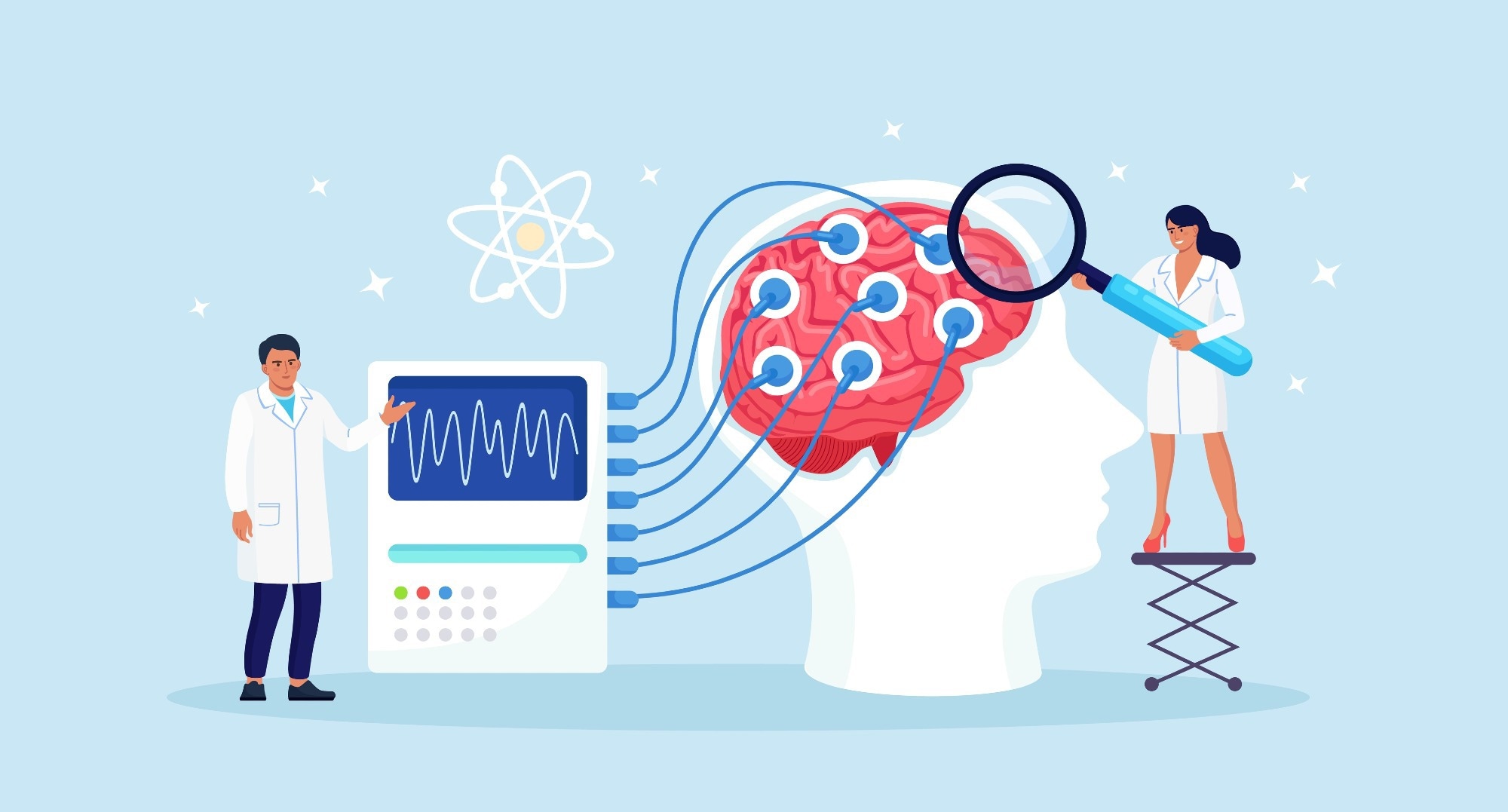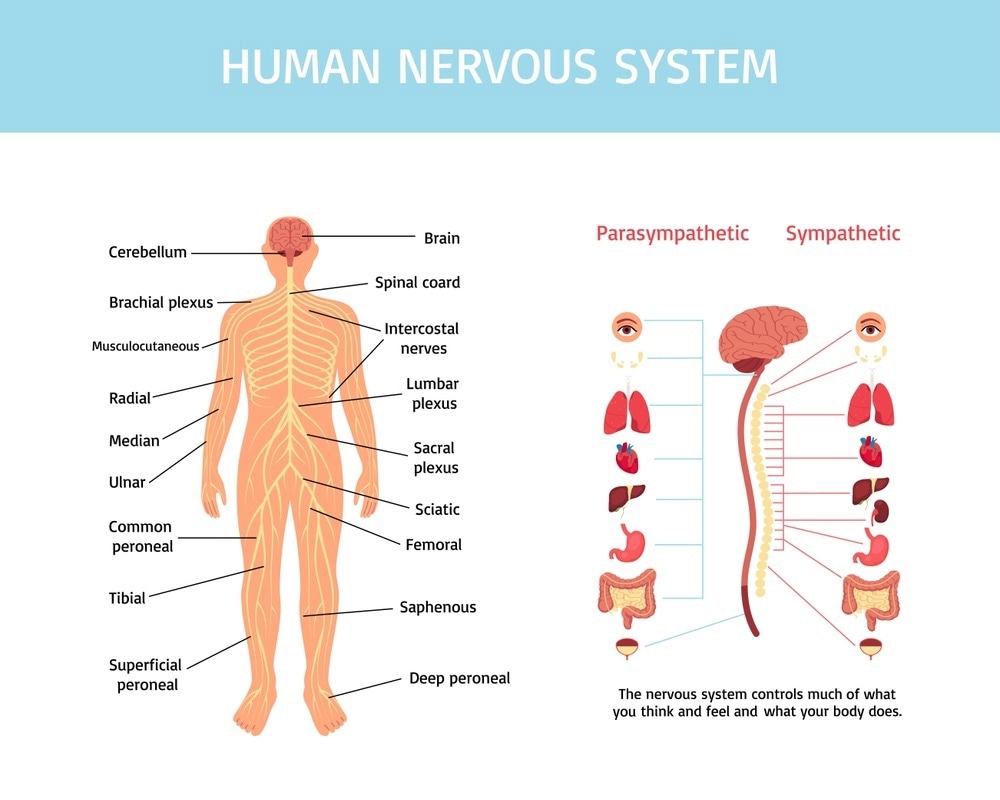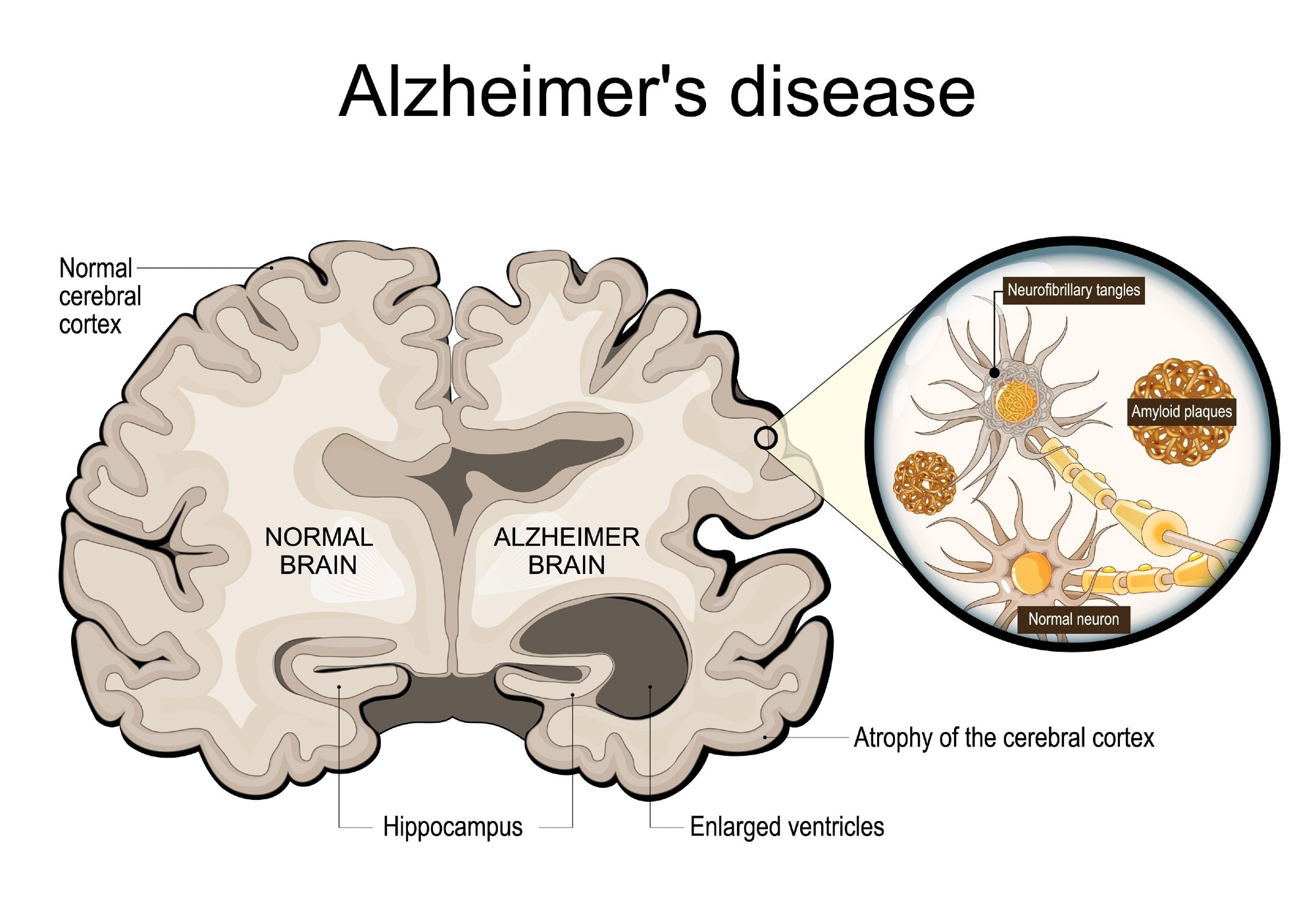What are neurological disorders?
What is a neurodegenerative disease?
Differences between neurological disorders and neurodegenerative diseases
Similarities between neurological disorders and neurodegenerative diseases
Conclusion
References
Further reading
Neurological disorders and neurodegenerative diseases impact many people. The Lancet published a study estimating that a neurological condition impacts more than one in three people. 1 Neurodegenerative diseases also impact a large part of the population: The World Health Organisation estimates that 55 million people have some form of dementia. 2

Image Credit: Buravleva stock/Shutterstock.com
Understanding the differences and similarities between neurological disorders and neurodegenerative diseases can be important when offering or accessing healthcare. It is also important for scientific reasons and to be sensitive about the topic.
What are neurological disorders?
Neurological disorders are a large range of conditions that affect any part of the nervous system. 3 The nervous system is made up of the brain, spinal cord, and nerves and can be split up into several smaller systems. 3 Chemical, structural, and electrical differences found in this system of organs can cause or be a part of these disorders. 3

Image Credit: Macrovector/Shutterstock.com
There are many neurological disorders with different characteristics and symptoms. Some examples include:
- Peripheral neuropathy: Nerve damage found in the peripheral nervous system 4
- Dysautonomia: Dysfunctioning in the autonomic nervous system 5
- Epilepsy: A group of seizure disorders, including generalized and focal epilepsy 6
- Migraines: Recurrent episodes of headaches, nausea, and sensory sensitivities 7
- Multiple sclerosis: Damage to the insulation of nerve cells caused by an autoimmune disease 8
And many more. Neurological disorders are a very diverse group of disorders, meaning they can impact people in a wide variety of ways. Because of this, they can also be managed or treated very differently from one another.
Neurological disorders are a varied cluster of conditions, sometimes with little in common besides their involvement in the nervous system. Even with that in mind, two different conditions could impact completely different aspects of the nervous system. For instance, multiple sclerosis is associated with the myelin insulation in neuron cells, while dysautonomia is involved in the behavior of the autonomic nervous system. 5, 8
What is a neurodegenerative disease?
Neurodegenerative diseases are progressive neurological disorders. This means they are diseases that affect the nervous system and can worsen over time because of cellular damage. 9

Image Credit: Designua/Shutterstock.com
Degenerative disease happens when organs or tissue deteriorate over time because of activity in the cells. 9 In neurodegenerative disorders, a process called neurodegeneration occurs. 9 This happens when cells in the nervous system die or stop functioning. 9
Some neurodegenerative disorders include:
- Alzheimer’s disease: A common type of dementia affecting memory, mood, and other processes 10
- Parkinson’s disease: A disorder that mostly impacts the creation of dopamine, leading to difficulties with movement and tremors 11
- Motor neuron disease: A group of conditions that impact the central nervous system’s motor neurons, leading to muscle weakness 12
Neurodegenerative diseases can differ greatly from one to another, meaning they may have very different causes, symptoms, characteristics, and treatment plans.13 Moreover, some diseases can also impact entirely different parts of the nervous system, despite both being neurological.
Neurodegenerative diseases are currently incurable, but they can be managed by slowing down their progression and supporting the patients’ quality of life. 14 Comorbid conditions can also be managed as a part of a treatment plan. 14
Differences between neurological disorders and neurodegenerative diseases
There are some differences between neurological disorders and neurodegenerative diseases based on their medical classification, how they are diagnosed, and how they are managed. Even more differences exist when comparing specific diagnoses.
Neurodegenerative diseases are all neurological disorders, but not all neurological disorders are neurodegenerative diseases. 15 This is for two reasons: Firstly, not all neurological disorders are progressive, meaning they do not all necessarily change or worsen over time. For example, Functional Neurological Disorders (FND) may not be neurodegenerative. 16, 17 Secondly, not all neurological conditions are classified as diseases.18
Developing Drugs for Neurodegenerative Diseases
Neurological disorders that are not neurodegenerative diseases do not lead to neurodegeneration. 19 For that reason, neurological disorders and neurodegenerative diseases may appear differently over longer periods. Non-degenerative neurological disorders can change over time, but that does not mean that the disorder is progressing or leading to degradation.
Similarities between neurological disorders and neurodegenerative diseases
Neurological disorders and neurodegenerative diseases are heavily overlapping groups. Given their connection to the nervous system, they can both impact similar parts of the body, for instance. 3, 9 However, the specific similarities depend more on the particular diagnosis at hand rather than their general classification as neurological disorders or neurodegenerative diseases.
Both neurological disorders and neurodegenerative diseases impact the nervous system, meaning they can affect the brain, spinal cord, nerves, and any associated cells. 3, 9 This means that two different conditions could both affect the same body parts. Similarly, some symptoms can overlap, meaning that some neurodegenerative diseases and neurological disorders could present quite similarly, depending on the condition.
Characteristics of Neurodegenerative Diseases and Advancements in Research
The treatment and management of different neurological disorders and neurodegenerative diseases depend on which specific condition is being cared for. The symptoms, characteristics, and underlying causes must all be considered when giving or receiving treatment. 13, 14, 16 Depending on the condition, it may be managed pharmacologically, with talking therapies and/or community-based care, among other strategies. 14, 16, 20
Conclusion
Neurological disorders and neurodegenerative diseases are two overlapping categories for conditions that affect any part of the nervous system. 3 Both can be long-term conditions with a wide range of symptoms, and they can affect or stem from the same organ system. 3
All neurodegenerative diseases are neurological disorders. 15 This is because neurodegeneration is localized specifically to cells in the nervous system. 19 However, not every neurological disease is a neurodegenerative disorder because many neurological disorders are not associated with neurodegeneration. 15, 19
Both neurodegenerative diseases and neurological disorders vary widely from condition to condition. Besides their association with the nervous system, the two types of conditions could differ greatly in their presentation and treatment. An understanding of specific conditions could be most beneficial for both improving and accessing care. 13
References
- Steinmetz, J. D., Seeher, K. M., Schiess, N., Nichols, E., Cao, B., Servili, C., … & Atalell, K. A. (2024). Global, regional, and national burden of disorders affecting the nervous system, 1990–2021: a systematic analysis for the Global Burden of Disease Study 2021. The Lancet Neurology, 23(4), 344-381. https://www.thelancet.com/journals/laneur/article/PIIS1474-4422(24)00038-3/fulltext
- Greenblat, C. (2023) Dementia. World Health Organisation (WHO). https://www.who.int/news-room/fact-sheets/detail/dementia
- Braun, M. (2008). Neurological disorders. The Neuropsychology Handbook. Springer.
- Lehmann, H. C., Wunderlich, G., Fink, G. R., & Sommer, C. (2020). Diagnosis of peripheral neuropathy. Neurological research and practice, 2, 1-7. https://neurolrespract.biomedcentral.com/articles/10.1186/s42466-020-00064-2
- Hovaguimian, A. (2023). Dysautonomia: diagnosis and management. Neurologic Clinics, 41(1), 193-213. https://pubmed.ncbi.nlm.nih.gov/36400555/
- Yuen, A. W., Keezer, M. R., & Sander, J. W. (2018). Epilepsy is a neurological and a systemic disorder. Epilepsy & Behavior, 78, 57-61. https://pubmed.ncbi.nlm.nih.gov/29175221/
- Wang, S. J., Chen, P. K., & Fuh, J. L. (2010). Comorbidities of migraine. Frontiers in neurology, 1, 16. https://www.frontiersin.org/journals/neurology/articles/10.3389/fneur.2010.00016/full
- Dobson, R., & Giovannoni, G. (2019). Multiple sclerosis–a review. European journal of neurology, 26(1), 27-40. https://pubmed.ncbi.nlm.nih.gov/30300457/
- Gitler, A. D., Dhillon, P., & Shorter, J. (2017). Neurodegenerative disease: models, mechanisms, and a new hope. Disease models & mechanisms, 10(5), 499-502. https://www.ncbi.nlm.nih.gov/pmc/articles/PMC5451177/
- Jeong, S. (2017). Molecular and cellular basis of neurodegeneration in Alzheimer’s disease. Molecules and cells, 40(9), 613-620. https://pubmed.ncbi.nlm.nih.gov/28927263/
- Marogianni, C., Sokratous, M., Dardiotis, E., Hadjigeorgiou, G. M., Bogdanos, D., & Xiromerisiou, G. (2020). Neurodegeneration and inflammation—an interesting interplay in Parkinson’s disease. International journal of molecular sciences, 21(22), 8421. https://pubmed.ncbi.nlm.nih.gov/33182554/
- Chipika, R. H., Mulkerrin, G., Pradat, P. F., Murad, A., Ango, F., Raoul, C., & Bede, P. (2022). Cerebellar pathology in motor neuron disease: neuroplasticity and neurodegeneration. Neural regeneration research, 17(11), 2335-2341. https://www.ncbi.nlm.nih.gov/pmc/articles/PMC9120698/#:~:text=Cerebellar%20pathology%20is%20an%20overlooked,degeneration%20of%20primary%20motor%20regions.
- Selvackadunco, S., Langford, K., Shah, Z., Hurley, S., Bodi, I., King, A., ... & Al-Sarraj, S. (2019). Comparison of clinical and neuropathological diagnoses of neurodegenerative diseases in two centres from the Brains for Dementia Research (BDR) cohort. Journal of neural transmission, 126, 327-337. https://pubmed.ncbi.nlm.nih.gov/30730007/
- Shusharina, N., Yukhnenko, D., Botman, S., Sapunov, V., Savinov, V., Kamyshov, G.,... & Voznyuk, I. (2023). Modern methods of diagnostics and treatment of neurodegenerative diseases and depression. Diagnostics, 13(3), 573. https://www.ncbi.nlm.nih.gov/pmc/articles/PMC9914271/
- Farooqui, T., & Farooqui, A. A. (2016). Perspective and Directions for Future Research on Trace Amines and Neurological Disorders. Trace Amines and Neurological Disorders. Academic Press. https://www.sciencedirect.com/science/article/abs/pii/B9780128036037000252
- Aybek, S., & Perez, D. L. (2022). Diagnosis and management of functional neurological disorder. BMJ, 376. https://www.bmj.com/content/376/bmj.o64
- Hallett, M., Aybek, S., Dworetzky, B. A., McWhirter, L., Staab, J. P., & Stone, J. (2022). Functional neurological disorder: new subtypes and shared mechanisms. The Lancet Neurology, 21(6), 537-550. https://www.thelancet.com/journals/laneur/article/PIIS1474-4422(21)00422-1/abstract
- Verhulst, F. C. (2010). Autism spectrum disorders: the word is not a disease. Nederlands Tijdschrift Voor Geneeskunde, 154, A1748-A1748. https://pubmed.ncbi.nlm.nih.gov/20456782/
- Przedborski, S., Vila, M., & Jackson-Lewis, V. (2003). Series Introduction: Neurodegeneration: What is it and where are we?. The Journal of clinical investigation, 111(1), 3-10. https://www.ncbi.nlm.nih.gov/pmc/articles/PMC151843/
- Reilly, S. T., Harding, A. J., Morbey, H., Ahmed, F., Williamson, P. R., Swarbrick, C.,... & Keady, J. (2020). What is important to people with dementia living at home? A set of core outcome items for use in the evaluation of non-pharmacological community-based health and social care interventions. Age and ageing, 49(4), 664-671. https://academic.oup.com/ageing/article/49/4/664/5739151
Further Reading
Last Updated: Sep 2, 2024